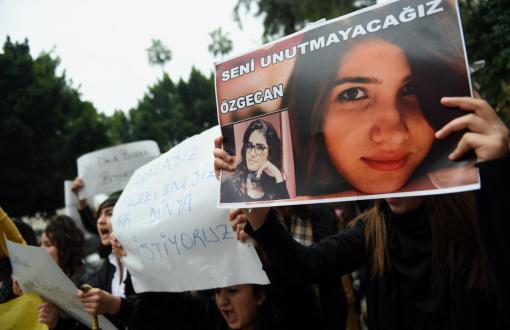* We won't forget you, Özgecan
A few days ago, Istanbul shrugged off a late-winter snowfall that shut down schools and businesses across the city for a few days. Many spent the time watching ill-prepared municipality workers take on the disorder from the comfort of their homes, and many more happily took to the streets to join in the once-a-year snowball fight they knew wouldn't last long. The gaiety was deceptive and also a welcome respite from what most would call an exceptionally grim winter in this country. Life in Turkey has been particularly uninspiring recently, and the events of the last few weeks have done more to freeze the bones than any storm could.
While spending the evening holed up in my warm apartment, perusing social media as the snow fell onto the street just outside, I came across something remarkable. A friend of mine had just posted an article on Facebook in memory of Özgecan Aslan, just one of the young women that we came to know this week through the news of their coarse and vulgar deaths.
A friend of his from back in the U.K. saw this woman's last name in the headline and not much else, and, attempting humor, posted a picture from a film adaptation of a popular fiction series by CS Lewis called The Lion, The Witch, And The Wardrobe. The picture was of a little girl crying over the body of a dead lion, the irony here being that the dead animal's name in those novels is none other than 'Aslan,' which happens to be Özgecan's surname and is also the very word for 'lion' in Turkish, Kazakh, Azerbaijani, and Chechen.
This man obviously was going for humor or some odd form of sympathy by posting the photograph. He later acknowledged how distasteful it was, and for a fleeting moment I agreed with that notion, it did seem in horribly poor taste.
But after thinking on it, I came to the conclusion that the image was an incredibly - if inadvertently - perfect symbol for her death. A little girl, burying her face into the dead body of a lion named Aslan.
I found it all the more terrifying that, in those books, that lion is supposed to be a representation of god, a steadfast hope that gives up its life for the benefit of all mankind. CS Lewis himself was a devoutly religious man. That a representation of a Christian god is being used as a metaphor for a dead Muslim girl, and that both share the same name, is, to me, entirely absurd, to the point of making me want to laugh and cry all at once.
It is also incredibly poignant. The dead lion in the picture becomes not only a representation of Özgecan, but of the sacrifice of all women, anywhere in the world, who have lost their lives from the violence perpetrated against them. Who then, the crying girl? Their families, their friends, both men and women alike. Anyone who gives a damn. Anyone who wants it to change for the better.
I read an article the other day in which the writer said, “Even in times of national mourning, Turkey can look ridiculously amusing.” He is right. He went on to mention how, minutes after a parliamentary session in which everyone made impassioned speeches in honor of Özgecan and vowed to fight violence in the country, politicians were hurling chairs at each other and rolling down the staircase in a heated argument about a new law. Some commemoration. There is humor in these events, and for the life of me, I have not seen darker, nor have I felt colder.
We have all heard about the event that spurned the ongoing conversations and protests taking place this week all over the country. Özgecan Aslan was a 19-year-old student from the city of Mersin who, last week one evening, got on a minibus with the intention of going home and instead ended up being sexually assaulted, stabbed, beaten, burned, and thrown into a river.
Let that sink in for a moment. Over the course of the last week, we've seen the headline so much that I think we've become desensitized to it. It is uncomfortable to think about, it is disturbing to say - and that's why it needs to be said, again and again.
A 19-year-old student went to a shopping center one day with her friend, an activity that is about the most innocuous and routine thing a person can do. She got on a minibus to go home, but instead was driven to a remote location by a stranger who wanted to touch, overpower, and own her. The driver then forcibly tried to have sex with the teenager, and when she fought back, he stabbed her multiple times in the torso with a blade. Because the knife wasn't enough, he then beat the life out of her with an iron rod. With the help of his father and a friend, he cut off her hands, fearing DNA tests would out him (she had defended herself, scratching at his face and neck). Her murderer, the driver of a dolmuş little different to the ones we all take everyday, then lit her body on fire - he lit the lifeless corpse of a teenage girl on fire - and her blood cauterized and her skin melted away and her hair turned to ash. And after all of that, he took this girl and tossed her into a riverbed. And there she rested: assaulted, knifed, bludgeoned, desecrated, charred, and drowned. Our lion. Our Aslan. God's latest sacrifice.
She is going to be forgotten. I see signs everywhere saying 'Özgecan Unutulmayacak' – 'Özgecan won't be forgotten' - they are lying. What of the other women we have already forgotten? What about S.K., the Antalya woman whom last Thursday was murdered by a man because she refused to go home with him? Or R.B., a woman in Diyarbakır whose refusal to hug her husband resulted in her death just this week? What space do they inhabit in our minds as we go through life, other than perhaps a flicker of sympathy in the back of our thoughts at night? And just like the thousands of other women we see stories about - beaten, raped, murdered – you are going to forget her. And maybe me telling you that you will is my challenge and my hope that you won't. That I wont.
But we will. (EB/BM)





